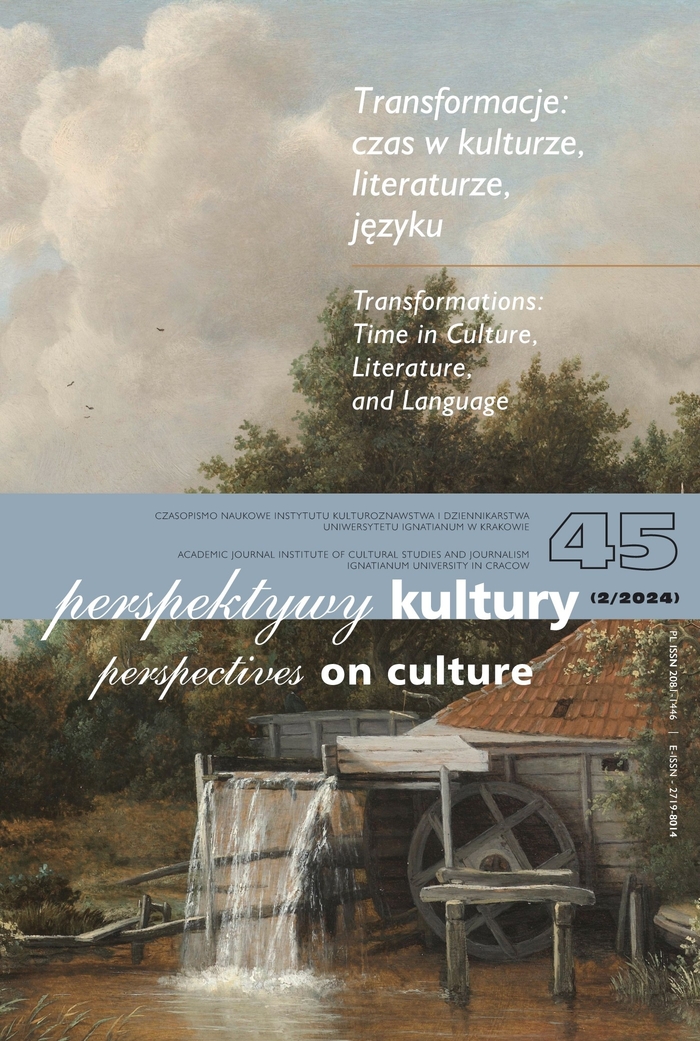Narratives of the Threshold
Timescape and the Novel in the Anthropocene
Abstract
This article develops a timescape perspective on the novel. It contends that timescape provides an analytical tool which prises open the novel’s capacity to confront the Anthropocene with narratives of the threshold. Timescape pertains to the imperceptible interactions between life and matter. It juxtaposes the culturally inflected notions of human time with Earth’s nonlinear temporal orders. Such reciprocities acquire a chronotopic and narrative expression in the novel, as testified by a sample of three British fictions under discussion: Maggie Gee’s The Flood (2004), Kazuo Ishiguro’s Never Let Me Go (2005), and Will Self ’s The Book of Dave (2006). These novels explore multitemporality in threshold situations, whose narrative pauses at once enhance and estrange the experience of time. Their respective timescapes disclose not only the existential crises inflicted by the Anthropocene, but also the planet’s temporal alterity.
References
Adam, B. (1998). Timescapes of Modernity: The Environment and Invisible Hazards. London: Routledge.
Bakhtin, M. (1984). Problems of Dostoevsky’s Poetics (C. Emerson, Ed. and Trans.). Minneapolis: University of Minnesota Press.
Bakhtin, M. M. (2001). Forms of Time and the Chronotope in the Novel: Notes Toward a Historical Poetics. In: M. Holquist (Ed.), The Dialogic Imagination: Four Essays (C. Emerson and M. Holquist, Trans.). Austin: University of Texas Press, 84-258.
Bjornerud, M. (2018). Timefulness: How Thinking Like a Geologist Can Help Save the World. Princeton: Princeton University Press.
Boxall, P. (2015). The Value of the Novel. Cambridge: Cambridge University Press.
Caracciolo, M. (2021). Narrating the Mesh: Form and Story in the Anthropocene. Charlottesville: University of Virginia Press.
Clark, T. (2015). Ecocriticism on the Edge: The Anthropocene as a Threshold Concept. London: Bloomsbury.
Edwards, C. (2019). All Aboard for Ararat: Islands in Contemporary Flood Fiction. ASAP/Journal, 4(1), 211-238.
Eliot, T. S. (2015). Four Quartets. In: C. Ricks and J. McCue (Eds.), The Poems of T. S. Eliot. Volume 1. Collected and Uncollected Poems. London: Faber and Faber, 177-209.
Gee, M. (2004). The Flood. London: Saqi.
Genette, G. (1983). Narrative Discourse: An Essay in Method (J. E. Lewin, Trans.). Ithaca: Cornell University Press.
Ghosh, A. (2016). The Great Derangement: Climate Change and the Unthinkable. Chicago: The University of Chicago Press.
Gingrich, B. (2021). The Pace of Fiction: Narrative Movement and the Novel. Oxford: Oxford University Press.
Heise, U. K. (2019). Science Fiction and the Timescales of the Anthropocene. English Literary History, 86(2), 275-304.
Ishiguro, K. (2005). Never Let Me Go. London: Faber and Faber.
Kermode, F. (2000). The Sense of an Ending: Studies in the Theory of Fiction. Oxford: Oxford University Press.
Morson, G. S., and Emerson, C. (1990). Mikhail Bakhtin: Creation of a Prosaics. Stanford: Stanford University Press.
Parkes, A. (2021). Ishiguro’s “ Rubbish”: Style and Sympathy in Never Let Me Go. MFS Modern Fiction Studies, 67(1), 171-204.
Self, W. (2007). The Book of Dave: A Revelation of the Recent Past and the Distant Future. London: Penguin.
Shadurski, M. (2023). “City Which Holds All Times and Places”: On Urban Landscape in Maggie Gee’s The Flood. In: M. G. Kelly and M. Paz (Eds.), Utopia, Equity and Ideology in Urban Texts: Fair and Unfair Cities. Cham: Palgrave Macmillan, 319-338.
Taylor, J. O. (2018). The Novel after Nature, Nature after the Novel: Richard Jefferies’s Anthropocene Romance. Studies in the Novel, 50(1), 108-133.
Trexler, A. (2015). Anthropocene Fictions: The Novel in a Time of Climate Change. Charlottesville: University of Virginia Press.
Vermeulen, P. (2020). Literature and the Anthropocene. London: Routledge.
Copyright (c) 2024 Perspectives on Culture

This work is licensed under a Creative Commons Attribution-NoDerivatives 4.0 International License.
Autor, zgłaszając swój artykuł, wyraża zgodę na korzystanie przez Wydawnictwo Uniwersystet Ignatianum z utworu na następujących polach eksploatacji:
- utrwalania utworu w formie papierowej, a także na nośniku cyfrowym lub magnetycznym;
- zwielokrotnienia utworu dowolną techniką, bez ograniczenia ilości wydań i liczby egzemplarzy;
- rozpowszechniania utworu i jego zwielokrotnionych egzemplarzy na jakimkolwiek nośniku, w tym wprowadzenia do obrotu, sprzedaży, użyczenia, najmu;
- wprowadzenia utworu do pamięci komputera;
- rozpowszechniania utworu w sieciach informatycznych, w tym w sieci Internet;
- publicznego wykonania, wystawienia, wyświetlenia, odtworzenia oraz nadawania i reemitowania, a także publicznego udostępniania utworu w taki sposób, aby każdy mógł mieć do niego dostęp w miejscu i czasie przez siebie wybranym.
Wydawca zobowiązuje się szanować osobiste prawa autorskie do utworu.





